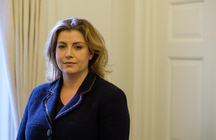Below is the text of the speech made by Penny Mordaunt, the Secretary of State for International Development, on 30 January 2019.
Good morning everyone, the first thing I want to say is a huge thank you for you all for coming together and for our shared commitment to create an AIDS free for all.
I am just going to go slightly off-script, don’t panic Officials but are Dean Street in the room today? I just wanted to give a shout out to Dean Street, because on my travels I have met so many people that have benefited from your amazing service. What you do is truly phenomenal and I think sometimes when we look at, what my budget is doing and DHSC’s budget is doing; we think about tests, we think about drugs and we think about all those numbers and things we can measure, what we sometimes don’t think about is health care professional time.
The thing that everyone always says about Dean Street is that quite often very vulnerable people with very complex lives are given time with health care professionals that makes a difference to them and gave them something that their GP couldn’t do for them, that other people couldn’t do for them and that I think is absolutely fantastic. At a moment when the Health Secretary and I and other members of the Cabinet are scratching our heads and thinking about Global Britain this is what Global Britain means to me, it’s our technical expertise, it’s our fantastic NHS as well as our budgets and all that we want to lever in and it’s everything that Britain has to offer the rest of the world; but Dean Street you’re wonderful.
I am delighted that the Department of Health and Social Care, is joining with DFID along with the the Elton John AIDS Foundation and the Evening Standard as well as the Fast Track Cities Initiative and Johnson&Johnson to achieve this fantastic partnership. And through the partnership we’ve highlighted that – while the world has made great strides in addressing HIV and AIDS – we must step up our efforts if we are to meet the Global Goal 3.3 to end AIDS by 2030.
That battle is far from over especially in poorer countries where stigma, lack of awareness and scarcity of life-saving medicines may persist. AIDS remember, is still the biggest killer of women of reproductive age around the world.
The UK continues to be at the forefront of the global AIDS response. In 2017, UK aid helped the Global Fund provide 17.5 million people with treatment and protect nearly 700,000 babies from infection. And our 20-year agreement with Unitaid and support to the Clinton Health Access Initiative has given the world great advancements in HIV testing and treatment, at affordable costs.
Our task is not easy, while we continue to advance some treatment, we must also address some of the most challenging drivers of HIV infection. Through UK aid supported research we now know that we will not reduce HIV infections if we don’t also address gender inequality and violence against women and girls. That’s why DFID continues to put women and girls at the heart of everything that we do.
In some parts of the world we are also seeing growing stigma and discrimination and a backlash against rights, all of which fuel HIV infections among some of the world’s most vulnerable people. In July last year, we proudly extended our support to the Robert Carr Civil Society Networks Fund by £6m to support populations affected by HIV.
And we are also delivering change at home. In the LGBT Action Plan, with my other hat on, we have committed to ensuring that health and social care services better meet the needs of lesbian, gay, bi-sexual and and trans people. From appointing a National Adviser on LGBT health, to make the changes to gender identity services, and to ensure that LGBT people receive better and more appropriate care.
In London and the UK, we have demonstrated what is possible if the right services and support are in place. We are so proud of London’s success and we are thrilled to be able to share our experiences and inspire other cities to accelerate towards their own 90-90-90 targets.
Through the AIDSfree appeal we are proudly supporting the Elton John AIDS Foundation to expand testing and treatment in Maputo in Mozambique and Nairobi in Kenya, for vulnerable young people. Through UK Aid Match, we are doubling public donations made through the Evening Standard appeal up to £2m, for projects in these two cities.
UK Aid Match means that every time the British public donate to the AIDSfree appeal, we will match this pound for pound and double their generosity. In this case, it will directly change – and in many cases, save – the lives of people living with HIV in those two cities. The appeal is still going so please help us publicise it.
And also through our significant funding to Unitaid, UK aid is supporting further work by the Elton John AIDS Foundation and it’s partners in Kenya to expand HIV testing and treatment for young men. This is the first project within the MenStar Coalition an initiative launched in Amsterdam last year to tackle HIV and AIDS which I was very pleased to endorse.
Today is about celebrating success and driving action – I applaud you for your leadership, your commitment and this partnership. We look forward to a productive day ahead, and to seeing the strides that we are going to take to achieve Global Goal 3.3: to end AIDS by 2030. Starting right here today at the Global Forum.
The scale of our ambition is clear, we all passionately believe that we can create an AIDS free future for the world, and I know that we’re going to.
